Plum Village community in France is enjoying our yearly 3-month rain retreat. Thay (our Teacher, Thich Nhat Hanh) offered a wonderful Dharma Talk regarding the spirit of the rain retreat on 12th September 2004 .
Please enjoy Part 2 of this talk. You may also like to read Part 1.
The art of serving
The monastic life has a purpose which is to transform our afflictions at the root. Of course, as a monastic, we want to become a Dharma instrument to help ourselves and other people. Because we want to help, that is why we left home to ordain. But why do we need to leave home to ordain to help people? Because the laity can also help people a lot. They are very active. They devote all their time and energy to helping the world. There are lay bodhisattvas who are present everywhere in the world in war zones where there is hatred, poverty, sickness, people of service are there. They don’t need to leave home to ordain, yet they still can do those things. Among us, there are many young [in age] monastics who also want to do social service, to help the world.
Why don’t they stay out there to do social service and help the world? Why do they have to ordain?
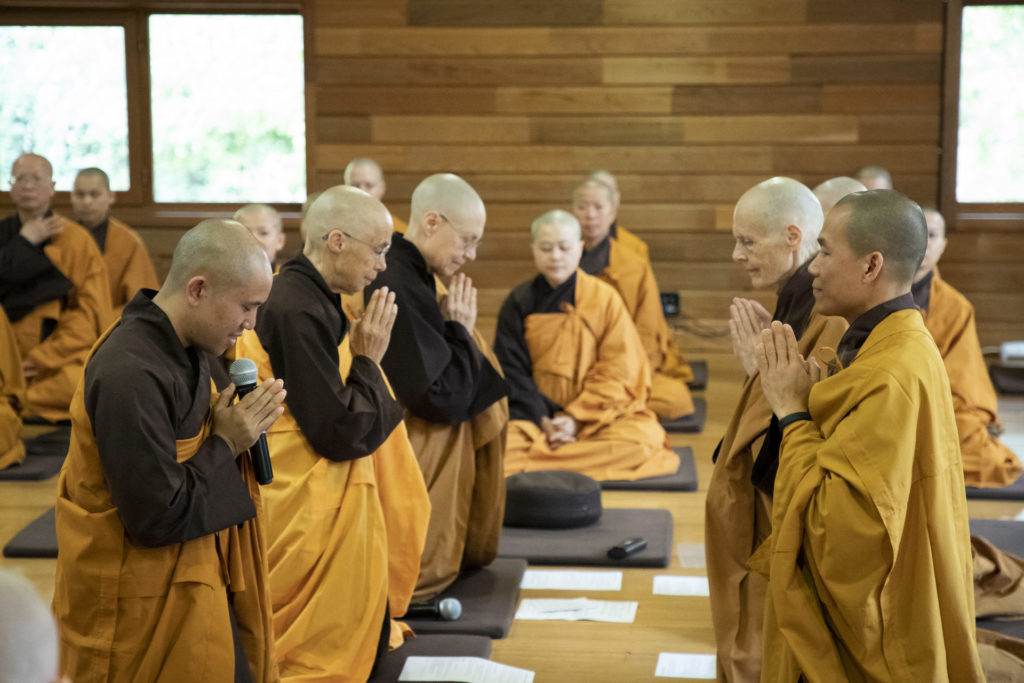
Because as a monastic, they have an opportunity to transform their wrong views, and their deep afflictions. Doing social work without the practice to transform their wrong views pains and afflictions, they might suffer while doing social work. They might become victims of jealousy, tiredness, discouragement, and of anger. So even though a monastic has the aspiration to do social work, to help the world, they need to know that their first task is to transform afflictions.
Lay people also want to transform their afflictions, but they have less opportunity. Occasionally they join a retreat, they also learn ways to transform afflictions. But as monastics, we have a much greater opportunity, we are able to live with the sangha 24 hours a day, year after year. And so we need to be able to differentiate between monastic and lay. If monastics only think about doing social work and are carried away by that wish, then they are not quite monastic. Because they know that when they transform their afflictions completely and transform their wrong views completely, then social work will become more profound. They can go further, longer. Some of us, after living in the sangha as a monastic for 3 or 4 years feel that living in the monastery, they are not very useful to the world. So they want to be more engaged in the world by going to places of poverty and war to help. Living in a monastery doesn’t seem like we are helping the world much.
That is their thinking. This is a very natural tendency. So we need to be reminded that our main responsibility is to first transform our afflictions. Of course in the monastery, while we learn and practice, people who suffer also come to us. If we are able to transform our afflictions, we are happy, peaceful and joyful, then we can help them directly. We don’t need to go out there. Once we can help those people, we know that when we go out there we will also be able to help. But if we still have suffering and afflictions, we need to know that our capacity is still limited. So we need to remember that our main purpose as a monastic is to transform afflictions
The social work of a monastic is not of the same nature as conventional social work because it is also spiritual work.
Once we are able to transform afflictions naturally we will have the capacity to help the world. Because we are not yet successful in transforming our afflictions, we think that we are unable to help many people while staying in the monastery, that only by going out there we can help many people. The tendency and wish to do social work may arise and you may be pushed by it. What is “it”? It is the lack of success in transforming our [basic] afflictions. People who leave home to ordain have conditions and opportunities to transform their deep afflictions. If we want to do social work, it is ok to do so as laypeople. But there is a risk of becoming a victim of afflictions and a possibility of abandoning the work halfway. As monastic, we are aware of this, so our way is different. We need to be able to help ourselves so that our helping others can be of good quality. Once we can help ourselves, our ability to help others will be of better quality. Maybe we spend less time on social work, but the work is of better quality. The social work of a monastic is not of the same nature as conventional social work because it is also spiritual work. It is our practice. Naturally, any young person who aspires to become a monastic also aspires to help the world, to help people. That is certain.
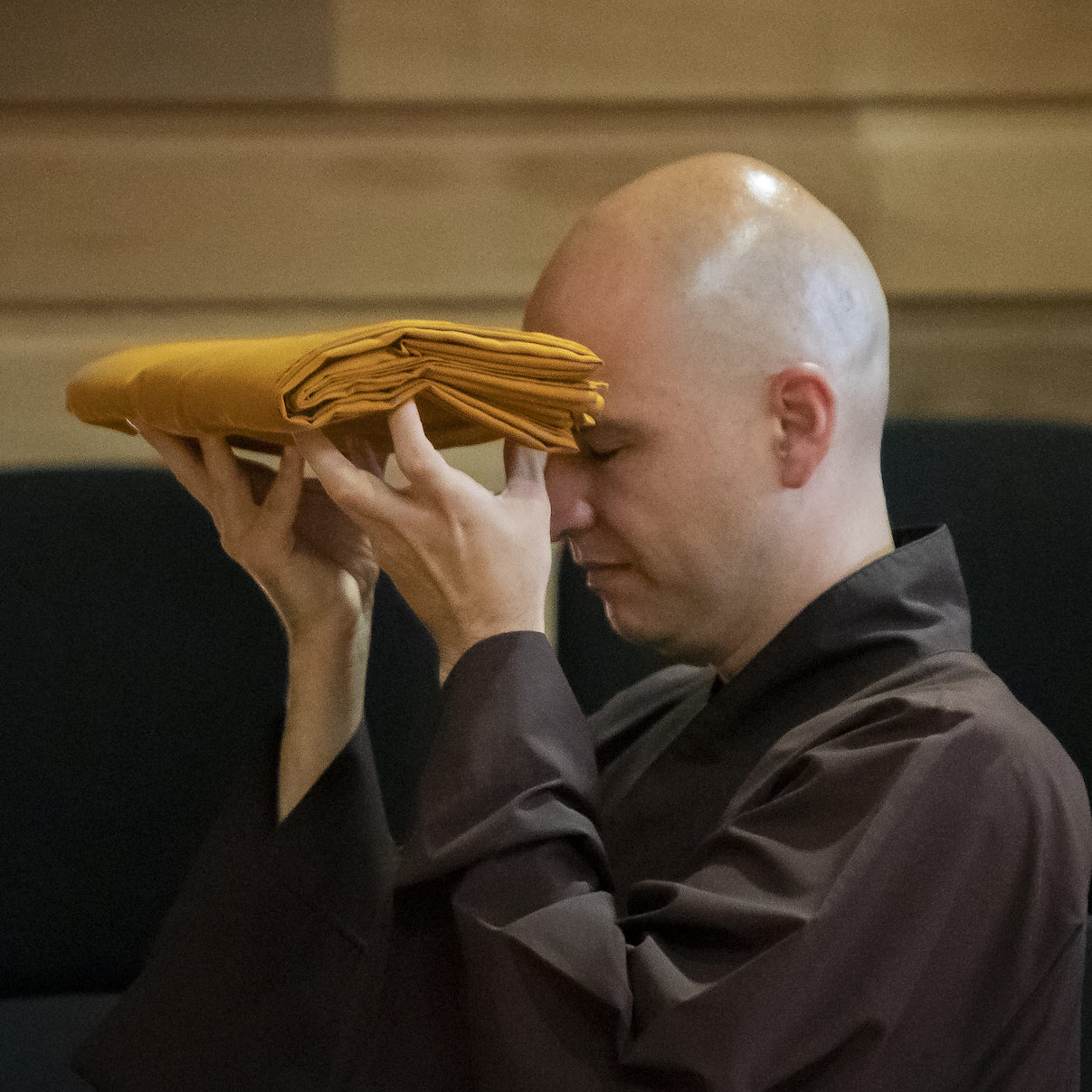
So the aspiration to go out there to help the world is very natural. But we need to reconsider, we see that firstly; the purpose of a monastic is to transform afflictions. We can do social work in parallel with transforming our afflictions, it is not necessary that we have to complete the work of transformation before we can start doing social work. Do we see many people in retreats who suffer and are we able to help them?
We have an opportunity now. If we see that we are still getting caught in afflictions heavily, we are unable to help ourselves, our elder brothers, elder sisters, younger ones, or lay friends who come to us, then how can we go out there to help and avoid losing ourselves? So if a brother or sister feels agitated, and thinks that living in the temple is not as useful as going out there, they need to reflect on this again. [Transforming afflictions] is the most profound purpose of a monastic.
Our daily necessities should be a little less than sufficient
In the monastic tradition, we hear about living according to the principle of “tam thường bất túc”. It means that the three daily necessities: food, clothing, and dwelling should be less than sufficient.
The three objects of consumption, three necessities for monastic life: food, clothing, and dwelling, should not be too adequate, should be a little bit short. “Bất túc” means inadequate. For example, on a scale of 10, we should have 9 out of 10. Don’t ever allow it to reach 10. It should be a little bit short. That is “tam thường bất túc”. One wonderful thing about it is that when we live according to this principle, we are happier than when we have things sufficiently or excessively. This is the truth.
“The more we consume, the happier we are.” That is not true.
When Thay was a novice, Thay had never eaten 100% full. Never 100% full. It was the same when Thay was sent to the Buddhist Institute. Always a little bit less from being full. Yet Thay was very healthy and had a good appetite, although the food was very simple. In Báo Quốc Buddhist Learning Institute, the novices grew sweet potatoes, not to eat the roots but only the leaves. In a dish of boiled sweet potatoes leaves, there were yellow and old leaves, yet we still enjoyed eating them so much. We rarely had stir-fry, we only had boiled green veggies, dipped in soy sauce. That was the most common food in temples. We only had the chewy highland rice, we didn’t have white rice from Thailand as we have now. Everyone had their own portion. That means they put two bowls of rice together and made it one portion. Pressing not too hard so that the gap between the two was about 10 millimeters.
There was a novice monk, who was very hungry, that was Thay Thiên Ân, who founded the International Buddhist Institute in the US later on. He used to persuade other novices to press more rice into the bowls and increase the gap to 20 mm. Because to him, eating two bowls of rice was not enough. When we sat at the table for a meal, there was a [monk’s] bowl in front of us if we were in the Rains retreat. After the 5 contemplations, we lifted the top bowl, put it down, then took some rice and put it into the top bowl, and had to finish it. If it was in the Rains retreat, we needed to “lưu phạn”. That means we shouldn’t finish it all. There were two bowls of rice, but we needed to share some with other beings. We ate with a very good appetite. And we were very healthy. We never felt bloated or too hungry. And there was just rice. [There was] not much else to go with it. Some pickles or boiled veggies helped us to eat the rice more easily. Rice was the main course.
If we look at Plum Village now, we can see that we eat a bit too much. We are not practicing “tam thường bất túc”. That is why we don’t have as good an appetite. We are not as healthy. We serve our plate to the fullest, then when we read the 5 contemplations. “May we transform unwholesome mental formations, especially our greed…” But we have already taken a lot of food, it’s a little late to contemplate. So we need to contemplate first, before serving the food. Don’t wait until after you sit down, invite the bell to contemplate. It is a bit too late.
That is why the Buddha invented the “ứng lượng khí”(An instrument of the proper measure.), which is our monastic bowl so that we know how much food we should take. And so we need to organize in such a way that our eating is in accordance with the principle of “tam thường bất túc”. That way we have a better appetite, and better health. Never eat until full, or too full. And if we chew really well we don’t need to eat a lot. Here, every year after we celebrate Christmas and New Year, everyone wants to have a fast because we have eaten too much.
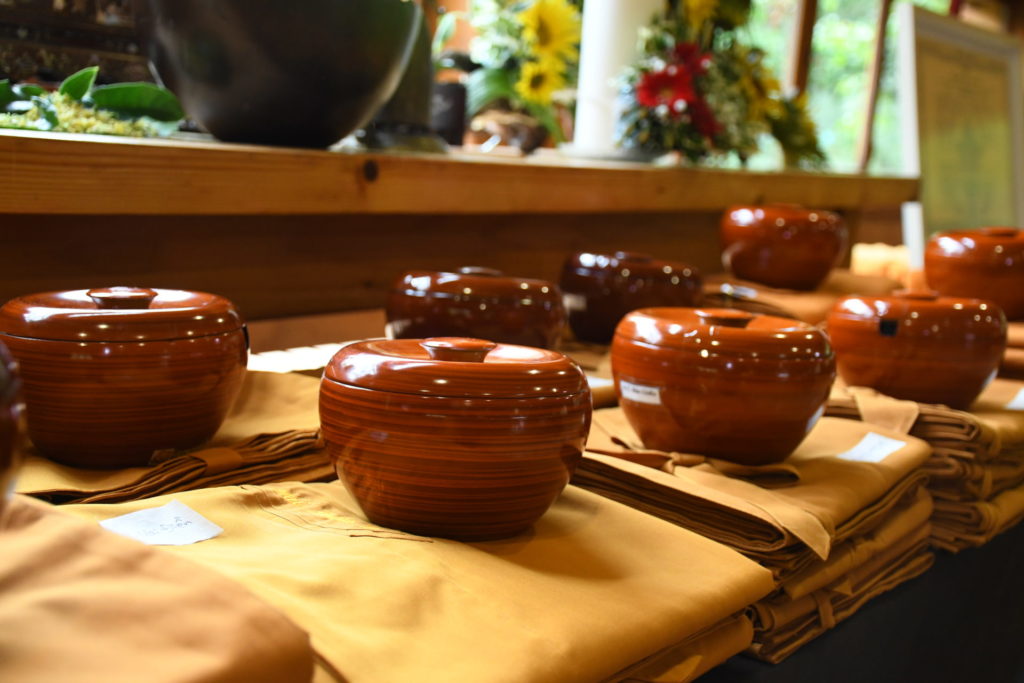
Recalling our teacher’s novicehood
When Thầy was a novice, it was cold in winter but we didn’t have a blanket, we only had a straw mat. We wrapped ourselves in straw mats. If we wrapped [ourselves in] two layers of straw mats, it could be quite warm. The cold wind could still get to our feet, so we used an old short robe to wrap around our feet, and we slept very well. We slept on a bed without a mattress. Actually, it was not a bed but a wooden plank [on top of two thin benches). When you go to Vietnam with Thay, Thay will show you that wooden plank Thay used to sleep on in his novicehood. It is very hard without any mattresses. There was only a straw mat. Yet we slept very well. Upon lying down, we slept immediately [and had] very good sleep.
What we call “personal space” is inside, not outside. Personal space only lies inside of us, not outside, and our life was truly communal.
About our rooms, no one had a room on their own. Not even a room for two. All rooms were shared by everyone. During the day we put the straw mats away, and the room was for common use. We didn’t have anything called “our room”. Nothing called “personal space”. Everything was for everyone to share. Anyone could go into any room to hang out. And we could go to any room also. During the day all rooms were common. At night it was a place for sleeping. We could lay a straw mat and bring out a pillow, but in the morning, we had to put it away, and it became a common room again. What we call “personal space” is inside, not outside. Personal space only lies inside of us, not outside, and our life was truly communal. We shared everything together, even time. Time is everyone’s time. There was no personal time. There was nothing that was called “personal time”. The three things: Food, clothes, and dwelling are like that. However, Thay must admit that Thay’s time as a novice was very happy. We were innocent, everything was taken care of by our teacher and the sangha. We didn’t have to worry about anything. It was the same during the time that we studied in the Buddhist Institute. At that time the Root temple had to pay the boarding and study fees for Thay. Not with money but with rice [still in the husk]. Two “giạ” (or 2 bushels = 40 liters) of rice. Because the Root temple Từ HIếu had land and rice fields, so each month the fees were paid by 40 kg of rice so that the novices [like Thay] could study at the Buddhist Institute. One thing you should know is that if you are happy during your novice time, then your bodhicitta is nourished, and you will be happy for your whole life as a monastic. That happiness is definitely not made of material conditions, because we were able to live our novice life, according to the principle of “tam thường bất túc”.
If Thay didn’t recall these things, you wouldn’t know about them. And how could you learn anything from them? Why did the patriarchs accentuate the principle of “tam thường bất túc”? It is because it helps a monk to become a true monk who is happy. That is in terms of consumption. We are living in a different era. We consume in a different way, but we can still follow the principle of simply living a life that is never with too much material comfort. For example, we know that we can eat one more bowl, but if we eat one more bowl, it is not good for us. It makes us less happy. So we refrain from eating that extra bowl. Those of you who have ever fasted know that during those days you can eat biscuits. If you chew it well, it is incredibly yummy. It is more delicious than any kinds of gourmet food.
So if you want to enjoy the food, eat less. This is what the Buddha himself said. King Pasenadi had a huge appetite. He was obese. Every time he went to the monastery, he felt very sleepy, even during the Buddha’s Dharma talks. One day he nearly walked into the Buddha. He didn’t see the Buddha as he slept while walking. The Buddha was amused. He said: “Your majesty, please eat less. By eating less, you will be healthier, more awake,”.
The King had an attendant with him. So the Buddha said,”Now this attendant of yours can arrange so that you can eat in moderation. Each meal you only eat a certain amount.” And the Buddha himself helped King Pasenadi [regain] his health, to become a bit slimmer. So the sentence “Eating a little less so that we are healthier,” was said by the Buddha himself to King Pasenadi.
Maybe some of you have never heard of the phrase “tam thường bất túc”, but that is a true standard of a monastic. We need to live like that to be a true monastic. Eating a little less, possessing fewer clothes, and the same for dwelling, not to look for too much comfort. And this is not just useful for monastics. It is also for laypeople. If laypeople can live like that, they will be happier. Our society thinks that the more we consume the happier we are. It is a very mistaken perception.
“The more we consume, the happier we are.” That is not true. The truth is the opposite. Consume with moderation, live simply, everything should be a little bit lacking, we will be much happier. We are about to start the three-month retreat, the brothers and sisters have an opportunity to change rooms, or move from this hamlet to another one. See if you have extra stuff. If you do, give some of it away.
You may also like to read Part 1.
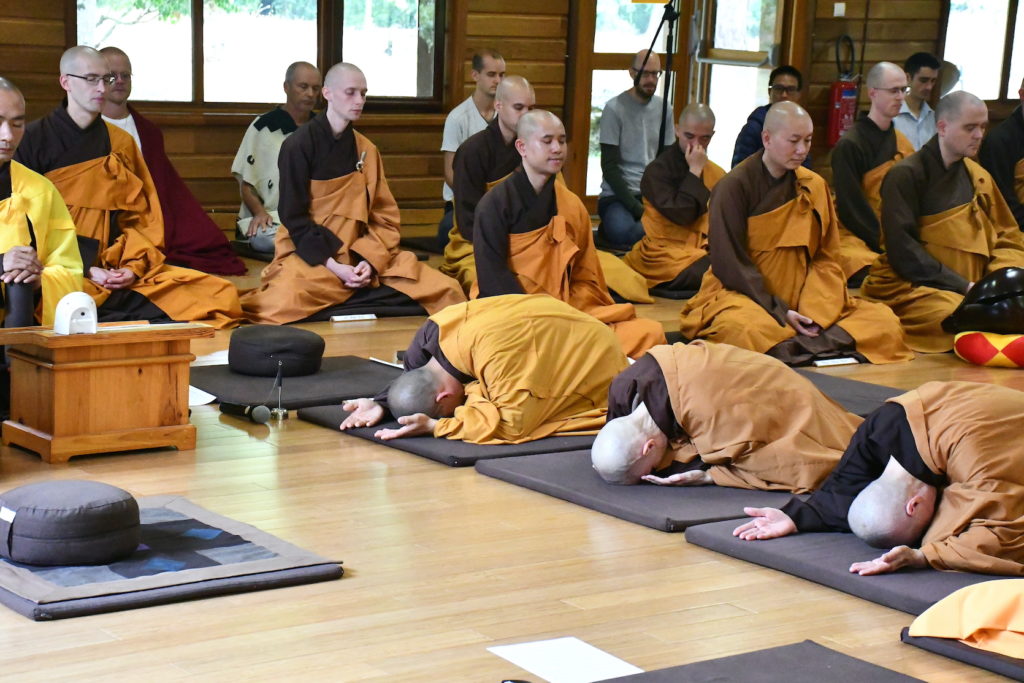



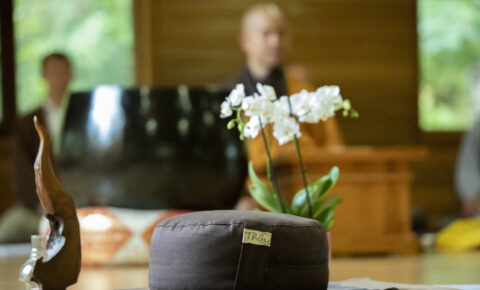

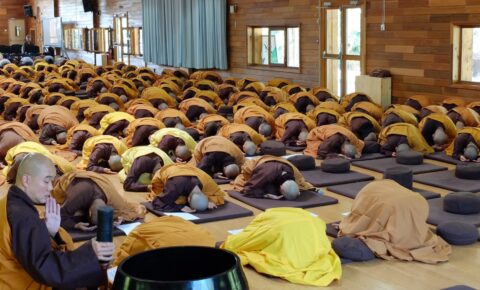
Share Your Reflections